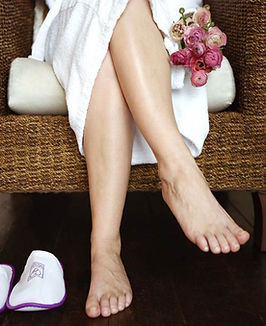




Personal Care & Mornings
Having dysautonomia means making adaptations to your everyday living. Here are some tips and suggestions to hopefully make life a bit more comfortable and safe.
Personal Care:
Your compromised system probably cannot deal easily with the need to remain vertical in the first place - then add in movement, humidity and temperature changes and you have a recipe for risk. Remember, disorders like dysautonomia can cause your blood pressure and heart rate to change from certain activities - including bathing and daily hygiene. Take care to not lock the door if you are feeling unwell. Always let someone know if you need to use the bathroom when dizzy and for any of the following activities. Bathrooms can be scary - they are full of hard surfaces, lots of corners and edges, and you are (most likely) alone. With a few simple modifications, you can save energy, stay safe, and keep up with your hygiene.
1. Bathing: Hot water is not recommended for either showering or taking a bath when you have dysautonomia. Why? Hot water dilates your blood vessels, and this can cause your heart rate to speed up and blood to pool in your extremities. Use warm or luke-warm water. Also, be careful to not hold your hands above your head for extended periods of time; this can also speed your heart rate. Many people opt to use a shower chair (pictured left) so they can sit while showering. Others with more severe symptoms may choose to sit in the tub, and use an extendable shower head fixture to bathe. You may need to adorn your bathroom with additional bars or chairs to accommodate your safe bathing. A bath or lying down in the tub while showering actually conserves energy and allows you to prop your feet up and lay back if dizzy.
2. Hair Care: Washing your hair can be challenging due to having to raise your hands above your head to do so. Raised arms can increase heart rate and be just plain exhausting. If you are not feeling well, or having a symptom flare, try to alternate days of washing hair with shaving; doing both activities can be too much. Also - consider keeping a dry shampoo handy for days when you want to freshen up your hair but can’t quite tolerate a shower (or maybe are too busy!).
3. Shaving: Sitting on a shower chair, down in the tub, or for men, in front of the vanity is a huge help when shaving. Assemble everything you will need beforehand. Please remember, shaving while dizzy is not recommended!
4. Bathroom Use: If you suffer from blood pooling in your legs, even sitting on a toilet can make you symptomatic. Consider putting a small stool or foot rest in front of your toilet to prop your feet up on. Just make sure it's not in the way so you don't trip! If you are a chronic fainter, consider wearing a helmet anytime in the bathroom. This will protect your head from all those hard surfaces if you pass out. Also, syncope can be triggered in some with Vasovagal fainting tendencies by using the bathroom, so please be careful!


Mornings:
Mornings are tough for many with dysautonomia, mainly because our body loses fluid overnight.
If you wake up with low blood pressure, feeling faint, or dizzy, try keeping fluids near your bed to drink before you even sit up. Something salty, like tomato juice or broth, combined with water can raise your blood pressure and possibly reduce dizziness in the morning. Studies have found that just drinking 16 oz of cold water can raise your BP significantly.
Always get up out of bed slowly! If you have issues with getting out of bed, first sit up in bed, then swing your legs over the edge and let your pressure adjust before attempting to stand. Some patients put their compression stockings or abdominal binder on before getting out of bed as well, which hopefully helps prevent blood pooling when changing positions.
Consider eating a healthy breakfast that is lower in processed carbs, which are a common trigger of symptoms for many dysautonomia patients. Also, check with your physician about caffeine/coffee intake - this can cause tachycardia. In some it raises blood pressure and they tolerate it well.
More to come! If you have suggestions you think other patients can benefit from, please email us. Thanks!
Written by Claire Martin, president of Dysautinomia SOS.






